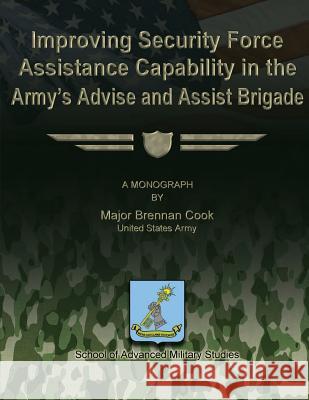Improving Security Force Assistance Capability in the Army's Advise and Assist Brigade » książka
Improving Security Force Assistance Capability in the Army's Advise and Assist Brigade
ISBN-13: 9781480029903 / Angielski / Miękka / 2012 / 62 str.
Improving Security Force Assistance Capability in the Army's Advise and Assist Brigade
ISBN-13: 9781480029903 / Angielski / Miękka / 2012 / 62 str.
(netto: 64,40 VAT: 5%)
Najniższa cena z 30 dni: 68,00
ok. 16-18 dni roboczych
Bez gwarancji dostawy przed świętami
Darmowa dostawa!
The U.S. Army's renewed emphasis on developing organizations to conduct Security Force Assistance (SFA), particularly the Advise and Assist Brigades, is indicative of both increased operational requirements in Iraq and Afghanistan and renewed interest in developing defense capacity in allied and partner nations. With over 255,000 soldiers deployed worldwide in 2009, the Army needs to develop a more effective conventional SFA apparatus to train indigenous forces to manage their own internal security requirements. By properly selecting, training, and utilizing quality conventional force personnel to fulfill SFA requirements, the Army can meet its current operational commitments while improving its ability to respond to emerging needs. Previous attempts by the French in Algeria and the U.S. Army in Vietnam and Korea to incorporate advisory missions into conventional operations highlight the need for developing highly skilled advisors capable of managing SFA tasks within Full Spectrum Operations. Current selection, training, and utilization models used by the North Atlantic Treaty Organization's Operational Mentor and Liaison Team (OMLT) program, the U.S. Marine Corps' Training and Advisor Group (MCTAG), and the U.S. Army's transition teams provide comparative analysis tools for developing a way forward. What is missing from each of these programs is a centralized identification and selection process, robust yet efficient training regimen, and a utilization mechanism to ensure highly skilled and trained advisors are serving where the Army needs them most, at the brigade. Historical precedents and current training programs suggest that though the U.S. Army has vastly improved its conventional advisory efforts since the Korean War, it still requires a new approach to Security Force Assistance. The 2010 Quadrennial Defense Review reemphasized the importance of assisting partners and allies with their own internal defense. By creating a functional area for advisors, the Army could better enable Advise and Assist Brigades to manage Full Spectrum Operations by providing the commander with advisors specifically selected, trained, and educated for SFA missions. The U.S. Army and U.S. Marine Corps will bear the brunt of providing such assistance, and the advisor functional area program could better prepare brigade-sized units for conducting those operations in both combat and non-combat environments.
Zawartość książki może nie spełniać oczekiwań – reklamacje nie obejmują treści, która mogła nie być redakcyjnie ani merytorycznie opracowana.











